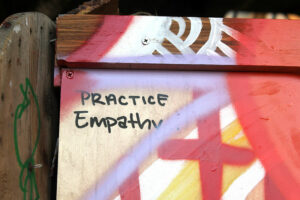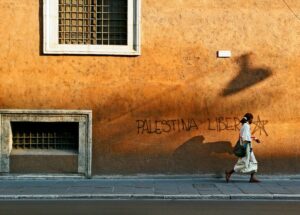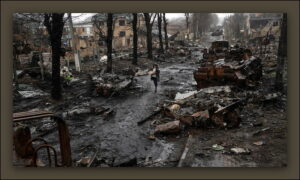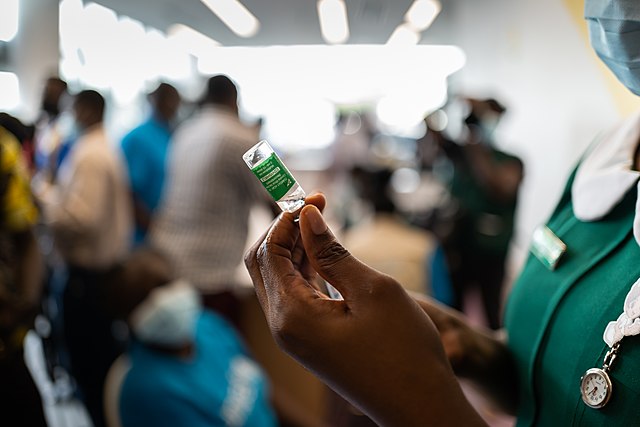On 2 March 2021, a nurse prepares to administer a dose of the AstraZeneca/Oxford COVID-19 vaccine at Accra’s Ridge Hospital, as Ghana rolls out its national COVID-19 vaccination campaign. . Photo by WHO / Blink Media – Nana Kofi Acqua. Used under CC-BY-SA-3.0-IGO
Demand and a market for locally produced vaccines is critical for sustainability of 15 COVID-19 vaccines manufacturing facilities, argues Benjamin Kagina of the Vaccines For Africa Initiative.
The history of vaccine manufacturing capacity in Africa dates back to 1881, when Egypt’s Vacsera company was established. Before the COVID pandemic was declared, there were eight African countries that, to our knowledge, had a record of vaccine manufacturing facilities (see the map). They were: Algeria, Egypt, Morocco and Tunisia (North Africa); Nigeria and Senegal (West Africa); Ethiopia (East Africa); and South Africa.
Between them they had 14 facilities.
Few were involved from end to end (discovery, fill and finish, pack and distribute) production process. Instead, the focus was largely on the late stage of production process – fill and finish as well as pack and distribution.
It’s therefore not surprising that Africa’s vaccine manufacturing capacity has been limited. The facilities supply less than 1% of vaccines needed for the continent.
Before the COVID pandemic, efforts to address the challenge of limited vaccine production on the continent yielded little success. The pandemic clearly exposed the limited capacity to manufacture vaccines. African countries were among the last in the world to begin rolling out COVID vaccines. This was largely due to limited access to vaccines and funding constraints.
As a result key stakeholders on the continent were joined by international partners, to advocate for the urgent and rapid establishment of COVID vaccines manufacturing capacity on the continent.
The urgency around manufacturing capacity
Vaccines nationalism and hoarding were topical issues in 2021. In a telling statement issued by the UN secretary general in October 2021, COVID vaccines nationalism and hoarding were hampering the global response to the pandemic, putting everyone at risk of the devastating impacts of the disease, including emergence of the SARS-COV-2 variants of concern. It did not make public health sense to have a few high income countries with excess supply of COVID-19 vaccines while low income countries had nothing.
Once COVID vaccines began to be approved – the first was Pfizer/BioNTech – there was high demand for rapid deployment to vaccinate 70% of the global population. Demand outstripped the supply. The COVAX facility, a global collaboration to accelerate development and equitable access to COVID vaccines, was established. Despite this, high income countries used their financial muscle to secure almost all available supply of COVID vaccines. Developing countries, including those on the continent, were left at the back of the queue.
African countries failed to secure the vaccines they needed. As a result, pressure began to mount on the leaders of African countries to develop local COVID vaccine manufacturing capacity.
In April 2021, the African Union Commission and Africa Centres for Disease Control hosted a two-day high-level summit to discuss the issue. The outcome of the summit was a framework for action prepared by the Partnerships for African Vaccine Manufacturing. At the same time, there were willing partners to support COVID vaccine manufacturing capacity in Africa, both within Africa and outside Africa.
A logical approach to solving the problem
The logical start for the continent was to use existing vaccine manufacturing capacity. Ten of the 14 existing manufacturing facilities were front runners in launching COVID vaccine production. Nine out of the 10 started production (late stages) of COVID vaccines in 2021.
Encouragingly, five new facilities from five more countries (Ghana, Kenya, Uganda, Rwanda and Botswana) are being set up to produce COVID vaccines. Some of the new facilities will start production of COVID vaccines as early as 2022. This is an incredible achievement.
The map provides an encouraging picture and it would be tempting to say that Africa will no longer be at the back of the queue in accessing COVID vaccines. On completion of the set up of all (15) COVID vaccines manufacturing facilities on the continent, Africa will be well positioned to produce other vaccines too.
A pertinent issue is the sustainability of the facilities. Demand and market for locally produced vaccines will be critical for the sustainability of the 15 COVID vaccines manufacturing facilities in Africa.
There’s a salutary lesson in the example provided by Aspen Pharmacare, the South African based vaccines manufacturing plant. It was the first on the continent to enter a non-binding agreement with J&J’s Janssen to manufacture COVID vaccines.
At the time of the agreement in 2021, J&J’s COVID vaccine ticked many boxes in terms of suitability for deployment on the continent. The plan was that all the vaccines manufactured at the plant would be distributed on the continent. But by May 2022, Aspen had not received orders to supply the COVID vaccines to the continent, possibly due to the changing dynamics of COVID vaccines supply in 2022 – supply appears to be greater than the demand.
Without demand for the vaccines, Aspen’s COVID vaccines manufacturing facility is at risk of closure. Key stakeholders such as Africa CDC and the South African government have called for African countries to place orders with Aspen.
While the problem of establishing COVID vaccines manufacturing capacity appears to have been partly resolved, a bigger problem lies ahead – sustaining the facilities on the continent.
- This article was written by Benjamin Kagina, Senior Research Officer & Co-Director, Vaccines For Africa Initiative, Faculty of Health Sciences, University of Cape Town.
This article is republished from The Conversation under a Creative Commons license. Read the original article.
Explore more on developmenteducation.ie

Urgently needed and timely new resource from Afri
Ciara Regan reviews Afri’s latest resource, Sowing Seeds of Peace, for post primary teachers which is adaptable and immediately useful across a range of school subjects.

It’s international women’s day. Don’t forget to tag us now that you feel #prettypowerful
From getting out to vote and entertaining two children off school due to it being a make-shift polling station, Ciara Regan reflects on international women’s day 2024.

Punching above its weight
Juan Acevedo-Ossa explores South Africa’s case against Israel as the latest example of its ability to act as a normative superpower, exceeding the great powers in shaping global moral discourse.

Empathy in a Divided World – workshop
Join us for this online session Empathy in a Divided World led by Brighid Golden to discuss how educators can respond to the challenges of selective empathy, both for ourselves personally and with others in our different settings.

What does Palestine have to do with Africa?
How does Israel’s current aggression on Gaza relate to Africa’s own history of political violence in Uganda and Africa?

‘What life is this?’: Escaping Ukraine’s occupied territories
From food shortages to informants, eight evacuees talk about life in Russian-occupied towns

